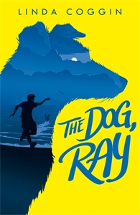The dog, Ray by Linda Coggin

Hot Key Books, 2015. ISBN 9781471403194
(Age: 11+) Unapologetically sappy, this inoffensive reincarnation
story hits the spot for 11 years plus readers. Immediately after
being killed in the same motor accident which leaves her father
severely disabled, Daisy finds herself in the afterlife and learns
that a limited number of souls exist, necessitating rebirth as
another being. Following an imperfect re-entry, Daisy retains
memories and human understanding (including the ability to read)
when she is born as a dog which leads to an overpowering urge to
return to her human parents for reunification.
Unfortunately for her, upon leaving the litter, she finds herself
owned by a lazy, selfish boy - Cyril, who neglects and fails more
than maltreating her, and Daisy has little compunction about bolting
when she has the chance. The dog embarks on several adventures,
meeting both kindly and intolerant humans on her quest to find her
family. Daisy's greatest impediment is the incapacity to speak and
her excited greetings, speeches and warnings to humans are naturally
heard as frightening or irritating barks. The ability for dogs and
some humans to have a mutually agreeable relationship and the
understanding of voiced communication from both parties is depicted
in a lovely way when she meets Jack, a homeless man who gives her to
Pip, a lad who is sleeping rough.
Like Daisy, Pip is searching for lost family following a bereavement
and the pair roam the countryside, protecting one another from
dangers which threaten those without a home.
This story delivers a lot in terms of showing the value of human
kindness lavished on both people and animals during life's journey.
I also liked the message that different family arrangements can be
loving, nurturing and supportive, a notion that may be some comfort
to children following bereavement or family breakdown. What touched
me the most in this story had less to do with spiritual revisiting
than thinking about the delightful attempts by affectionate animals
to commune with those whom they love.
Believing in reincarnation was no problem for the purpose of reading
this story, however accepting that children in a contemporary
narrative for Australia could be called 'Daisy', 'Cyril' and 'Pip'
was difficult.
Rob Welsh